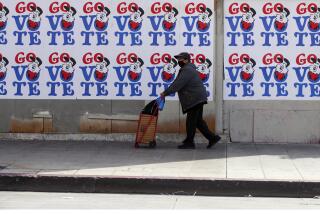Zero Tolerance
- Share via
In a critique of proposed zero-tolerance measures in Poway and San Diego, the Los Angeles Times wrote on Sept. 10 (“Anti-Drug Push Needs Restraint”) that “we are troubled by the inclusion of drug use or possession in small amounts (without evidence of drug dealing) as one of the grounds for eviction.” The Times cited as harsh the circumstances of a teen-ager who “experiments” with illegal drugs, resulting in the eviction of the otherwise unaware family.
However, The Times’ policy of “small” tolerance is left over from the 1960s. “Small” tolerance sends the message that use in “small amounts” (whatever that is) is OK. It sets no standards and does nothing to help the user, the family or the community. Zero tolerance, on the other hand, can help.
A zero-tolerance policy can help prevent drug use. The Clean Foundation has found that the fear of getting caught is the strongest force many youngsters have in overcoming peer pressure. Zero tolerance can act as a crutch--one reason to say no in the face of peer pressure. Whether the criminal justice system provides that crutch is debatable. But, the risk of losing one’s apartment and having to move can.
What’s more, The Times assumes that all parents are responsible in educating and monitoring their children. Sadly, some simply do not care or will not recognize the problem until it impacts them personally. A zero-tolerance policy can provide the incentive or shock needed by some to seek help. As a shock, losing one’s home is better than losing one’s child.
Finally, The Times assumes the extraordinary case. Most cases will undoubtedly involve removal of a well-known drug nuisance from the neighborhood.
The major benefit of zero tolerance is establishing a clear community standard, which “small” tolerance does not. Over 80% of property crime is related to the drug problem, over $20 billion per year is spent on illicit drugs, and its victims are widespread. It is not only a personal problem, but a community nuisance; and we have a right to say no.
JAN GOLDSMITH
Poway city councilman


